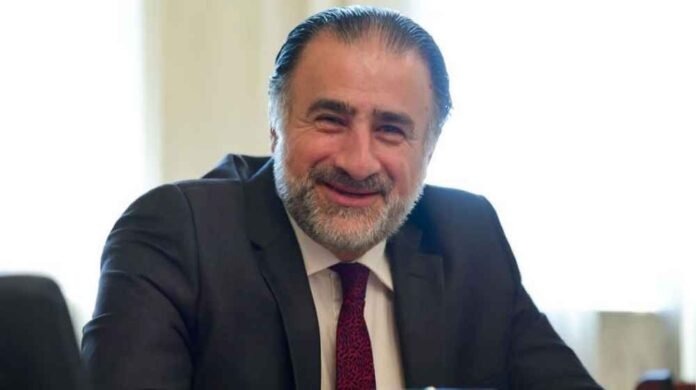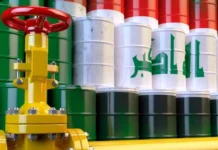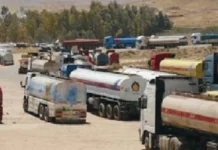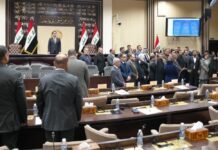In an extensive article published in the London newspaper Al-Sharq Al-Awsat, a well-known advisor to the prime minister of Iraq discussed the intense tension that followed the American bombing of sites in Iraq last week. The article also reviewed Baghdad’s vision for the presence of international coalition forces and included discussions that took place behind closed doors with Western ambassadors. Ultimately, the article concluded that Iraq He sees indicators of a “imminent war” and urges Washington and Tehran to come up with a “alternative to Iraq,” which both countries are already exploiting as a base and a corridor to guard Middle Eastern supply routes and logistical needs.
Baghdad: Washington provided us with information during the attack, but it was ineffective.
Baghdad: Washington provided us with information during the attack, but it was useless. Sudanese consultant
I discussed Prime Minister Muhammad Shiaa al-Sudani’s announcement to end the presence of forces with the ambassador of one of the European nations in Baghdad during this time when regional and international powers are fighting to increase their influence in the Middle East amid the sound of impending war drums that are still beating here and there around the clock. He questioned me about the ultimate objective of the multinational coalition in Iraq.
Even if the issue is straightforward, it deserves to have its response clarified for the benefit of all parties involved—the ambassador, the international community, and the general public, since the Iraqi people are still in need of an explanation.
The objective might be clear and straightforward, yet the rising degree of strain with respect to either party remains behind the intricacy of the scene. Iraq is without a doubt a nation looking to move away from contribution in a conflict forced by another party that without a doubt compromises its future and the fate of its ages and subverts its tranquility and dependability. A country that is quick to really focus on residents have been depleted by these conflicts, to furnish them with wellbeing, raise the degree of fundamental administrations, redevelop foundation, and contribute its human and normal assets to construct a promising future for individuals. To accomplish all of this, Iraq should leave the circle of territorial and global struggle and end the tactical presence that was laid out to battle ISIS, as the State head trusts that “ISIS doesn’t today address a danger to the Iraqi state.”
Throughout recent years, Iraq has survived a progression of destroying wars, the first was the Iraq-Iran war, then, at that point, the Bay Conflicts and the defeat of the system, the remainder of which was the ISIS war. Iraq went from being the strongest nation in the region to the weakest as a result of these wars, which caused more destruction, tragedies, and difficulties. Its monetary abundance was disseminated and it became obliged many billions to different nations in the district and the world. Its foundation and its military, modern and farming capacities imploded, until destitution impacted in excess of a fourth of its populace, joblessness spread and the training areas fell. In addition, there are alarming numbers of deaths among young men, children, and women, as well as in terms of health and basic services.
Notwithstanding this grave legacy, the current administration, led by Muhammad Shiaa Al-Sudani, has set itself the goal of reconstructing the state in accordance with an ambitious program. However, in the process, it has found itself embroiled in a regional and global conflict, with none of the involved parties considering Iraq’s interests in favor of their own. Iraqi. Following the events in Gaza in October of last year, the situation grew more complex.
The administration is committed to achieving its objectives, and it cannot do so if Iraq continues to be a theater of battle with a tense and uneasy military and security environment that raises the possibility of a wider and more intense conflict than the one we are presently seeing. Action must be taken in several areas and directions in order to end this war:
First: Developing and bolstering bilateral ties with the nations that make up the international coalition in a manner that benefits Iraq, meets the demands of the state of Iraq, and advances shared interests with those nations. “Iraq does not mind cooperating with the countries of the international coalition in the field of armament, training, and equipment, within the framework of bilateral relations that bring together Iraq and the countries of this coalition,” the prime minister’s statement following his meeting with the secretary-general of NATO in Davos said.
Second: Eliminating Iraq from the field of contention, as Iraq would rather not be involved with provincial struggles, yet rather needs to stay at similar distance with all nations, particularly those engaged with this contention. Iraq considers both Iran and the US to be its essential accomplices, and it can’t be involved with what is happening between them at the level of the whole area. This contention is apparent in Syria, as Iran needs an air and land scaffold to arrive at Syria, while the US needs to utilize An iraqi area to help the presence of its powers in Syria. Nonetheless, every one of them can track down elective ways of serving their inclinations and plans, whether in Syria or different hotbeds of seething struggle, without including Iraq in the ongoing clash.
Third: Increasing Iraq’s visibility in the regional and global spheres, as Iraq is neither a party’s backyard nor a partner. Iraq is able to play a major role in international politics and diplomacy due to its numerous strengths. Iraq holds a significant position in the global energy industry. It is the only Arab nation having distinguishing links to all surrounding nations and the big powers, both eastern and western, and it has a strategic location in the Middle East. It is a nation of great significance as well. in the battle against terrorism.
Fourth: Fostering shared interests between the nations in the area and the global community. Iraq has the financial resources and material skills to propose strategic initiatives that these nations may use to run their businesses and economies, whether directly or indirectly. Iraq also wants to reconstruct the state and its infrastructure.
Fifth: When it comes to combating terrorism, which is commanded by ISIS, the Iraqi troops are the most skilled and informed. Through unmatched bravery and daring, these soldiers defeated the most vicious and dangerous terrorist groups and prevailed in a bloody street battle. The lessons learned from Iraq’s battle against the most potent terrorist cells and organizations can be useful to the world community.
The Iraqi state prioritizes putting an end to the state of conflict. In response to the ambassador’s query, Iraq wishes to provide security and prosperity for its people by all means necessary, and it possesses all the necessary natural and human resources in addition to a key geographic location.
The people have experienced the ills and suffering they have endured for many years, and now is the right time for them to live in peace. This is soon to happen given the recently announced government program, as well as the fact that the Prime Minister’s insistence on implementing the policies outlined in his government’s program has made it clear to the Iraqis what their true goals and aspirations are. Opportunities rarely come around again, so it is crucial for allies from friendly and allied nations to seize this one. They also need to keep in mind that Iraq’s stability and prosperity are essential to the political, security, and economic stability of the entire region.





